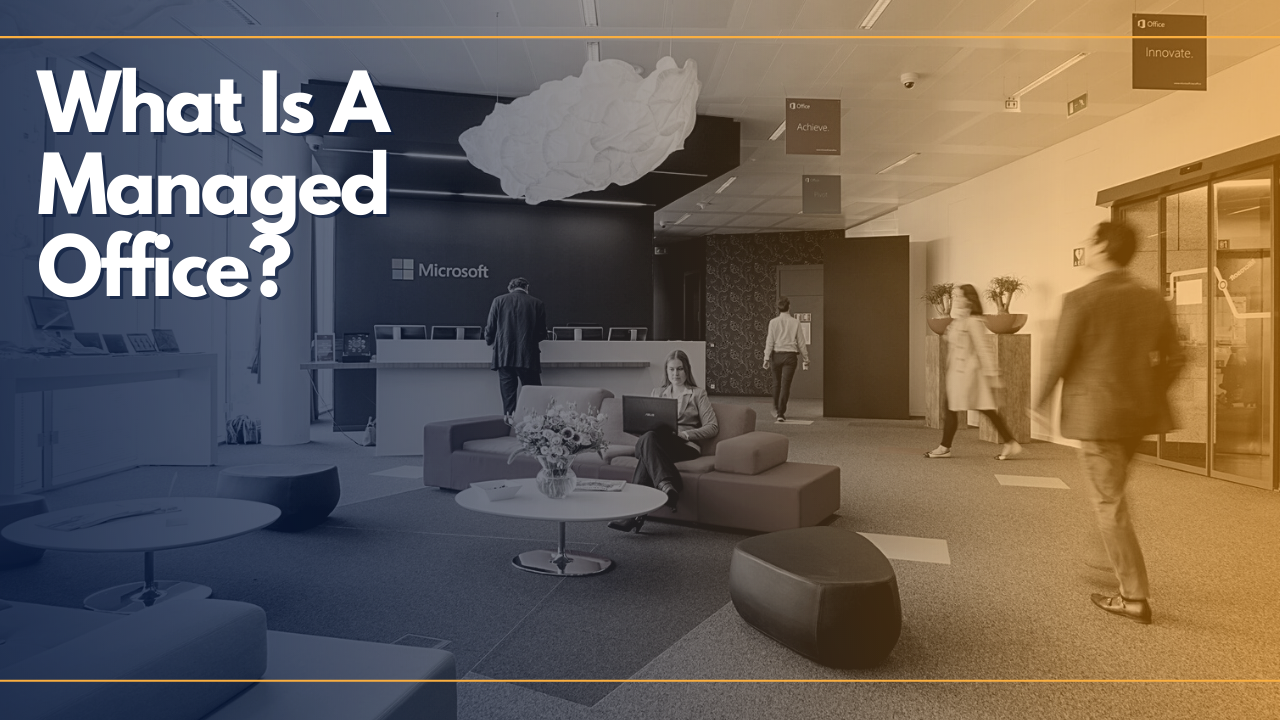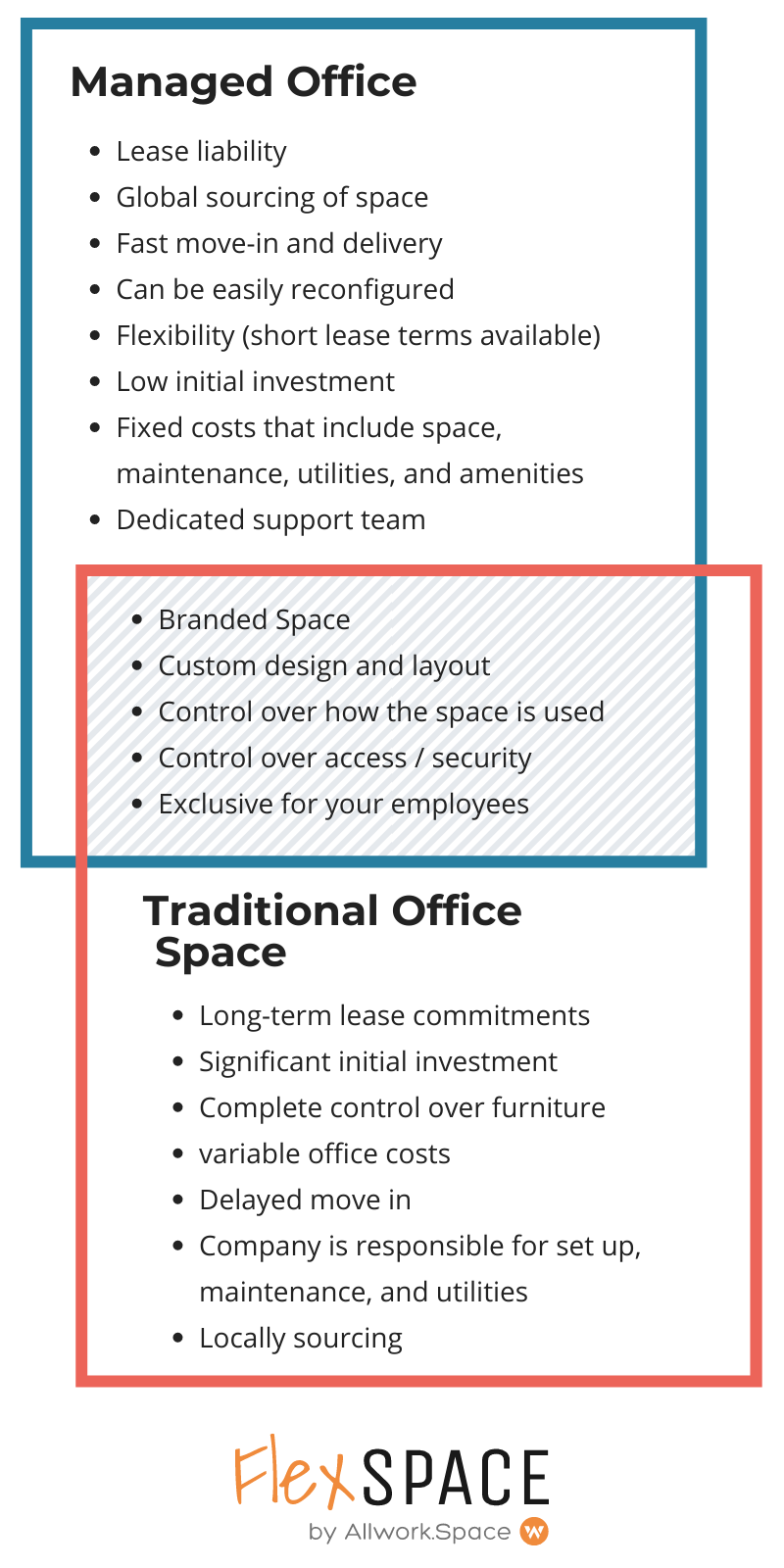What if there was a solution that could lighten the burden of operating or starting a new company? Imagine being able to focus on kickstarting a business rather than:
- Researching hundreds of workspaces
- Analyzing and agreeing to lengthy leases
- Equipping an office with expensive supplies and amenities
- Keeping your balance sheet in check
A managed office is a tailored workspace solution that is procured and managed by a third-party supplier. Managed offices are a type of workspace-as-a-service solution that provides the agility and cost-effectiveness of a flexible workspace (or serviced office) with the added benefit of control and security of a traditional lease.
- Traditional Office Space vs Managed Offices
- Managed Offices vs Other Flexible Workspace Solutions
- Benefits of a Managed Space
- Which Office Space Option Is Best for Your Company?
Gone are the days of lease liabilities. With managed workspaces, companies only have to worry about payments to the managed office space facilitator. Managed office facilitators are a one-stop-shop that do all the work for you–from finding and outfitting space, to maintenance and operations– to your specifications, so you don’t have to.
So how do you determine whether this type of space is right for your company?
Consider the following:
- Are you aiming for cost efficiency?
- Would you prefer to dedicate your time on expanding and networking?
- Do you want to future-proof your business?
Managed Office – Ultimate Definition
Unlike a flexible workspace, managed offices are branded like owned offices and are not shared with other companies.
A tailored workspace solution that is procured and managed by a third-party supplier; it provides the agility and cost-effectiveness of a flexible workspace, but allows for branding and increased control and security.
Traditional Office Space vs Managed Offices
As you can see, managed offices provide all of the advantages of traditional office space, with the added benefit that managed spaces are low-cost, much more flexible, and ready to move-in in less than 8 weeks.
One of the greatest benefits of managed space for companies is that the entire process is managed by a third-party.
For example, The Instant Group is one of the more well-known curators of managed space that tailors its services to alleviate any pressure that comes with ensuring your office is equipped with the appropriate amenities, operation and design.
A managed workspace provider will take care of everything, from market research and finding the right building, to designing and fitting out the space according to your needs and procuring furniture, fittings, utilities, and more.
Doing so allows companies to decrease the use of capital expenditure on every day office maintenance and put it towards improving their own culture, revenue and productivity.
Your managed workspace provider will also manage day-to-day workspace needs and be in charge of any maintenance issues that could potentially arise.
Applying your organization’s CAPEX to further productivity could lead to a boost in revenue from increased sales, thus helping grow your firm’s valuation.
In simple words, a managed office space (unlike a traditional office space) allows for your employees, managers, and executives to focus on the company’s core business needs and goals; without the noise and challenges that are associated with running and managing an office.
You can help your business find the ideal managed office to lighten the load here.
Managed Offices vs Other Flexible Workspace Solutions
One of the main selling points of managed offices is flexibility on multiple levels.
But don’t coworking spaces and serviced offices, as well as other workspace-as-a-service options also offer flexibility?
Yes. They do.
So, what gives? How are managed offices different or what additional benefit do they provide for companies?
It mostly boils down to three core differences:
- Privacy and security
- Branding
- Control
Let’s take a look at each of these elements.
How Managed Offices Keep Your Business Secure
Unlike most flexible workspace solutions, like coworking spaces serviced offices, managed offices allow for more privacy and security.
Coworking spaces and serviced offices are pre-designed, fully equipped facilities that cater to workers from different companies and occupations. Additionally, because the membership-base of these spaces is so varied, this means that your company will have little to no control over who enters the space and who uses the facilities and how.
Also, depending on the type of membership that your employees have, they could either be in a private office or sharing their space with several other people. This means that others could, unintentionally, be privy to sensitive and confidential information.
As a company, you have little to no say about the IT infrastructure available in a coworking space or serviced office. This means that your employees are likely to share a network with others, which could put them at an increased risk for cyberattacks or data/information leaks.
The IT aspect of coworking spaces and services offices has been one of the main reasons why organizations continue to reject the idea of workspace-as-a-service solutions.
Having a managed space, on the other hand, gives you full control over privacy and security issues, including who accesses the space and how your network and IT infrastructure are set up.
Branding
Another key reason why companies continue to steer clear from coworking spaces and serviced offices is branding.
These workspaces do not allow for companies to brand the space as their own. Though some flexible workspace providers make some exceptions on this, especially if a member has a private office, the amount of branding that a company is allowed to set up tends to be minimal.
Many companies argue that this has a direct impact on company culture and can also affect how vendors, business partners, and clients perceive their company; especially given that reception areas in flexible workspaces tend to be branded with the provider’s logo and name.
On the other hand, managed offices are fully built and fit-out according to your specific business needs; they are also exclusive to your company. This means that you can brand the space as you please.
In fact, managed space providers typically work hand-in-hand with an in-house team from your company. This ensures that the design, colors, and furniture align well with your brand image and voice.
Control
Because managed office space providers work with an in-house team of your company, your company has more control over the workplace.
This means that your company will have control over elements such as:
- Who can access the space and when.
- Meeting rooms and conference rooms availability.
- Private and communal areas (including kitchen, lounge areas, open workstations).
- The IT infrastructure that is set up.
- Aesthetics of the environment (design, furniture, signage, branding).
Managed offices are the sweet spot between the flexibility and agility of coworking spaces and the control and security from traditional office space.
With managed offices, you are able to reap the benefits of plug-and-play workspace solutions like coworking without the drawbacks like privacy, security, branding, and control. At the same time, managed offices allow companies to reap the benefits of traditional office space, without the main disadvantages like hidden costs, long-term commitments, and delayed move-in.
Which Option Is Best for Your Company?
Between all three options of traditional office space, flexible space, and managed office space, each have their own set of benefits and drawbacks. Each option is best suited for different needs and different companies might find that one solution fits them best than the other.
So, how can company leaders determine which is the best option?
Managed Offices
Companies often go the route of a managed office when:
- They want to set up a satellite office
- They are entering a new market / location and want to move in fast
- During times of uncertainty where entering into long-term commitments is advised against.
- When starting or growing a business and cost certainty is an important factor to plan for the future.
- Company expansion.
Coworking Space or Flexible Workspace
- Small companies of less than 10.
- When your company only needs to place a few employees for a short period of time in a new market/location.
- When the company is subsidizing office costs for remote workers.
- When a company needs immediate availability and occupation.
- When a company is searching for super flexible commitments (less than six months).
Traditional Office Space
- When you’ve already been in a building a long-time and can negotiate lease terms and prices.
- For companies that require large HQs.
- When a company already has a dedicated real estate team that’s solely responsible for the real estate strategy and management.
Generally speaking, companies around the world are increasingly shifting towards more flexible workplace solutions.
Instant Offices predicts that by 2023 35% of office space will be flexible. JLL estimates that by 2030, 30% of corporate real estate portfolios will consist of flexible space.
While coworking spaces have been an attractive solution for entrepreneurs and startups, coworking space providers have struggled to attract large companies that prioritize branding, IT security, and company culture.
Managed offices are able to cater to the needs of large businesses without compromising flexibility, affordability, and control.
Want to explore your options and see how much a managed workspace costs?



















